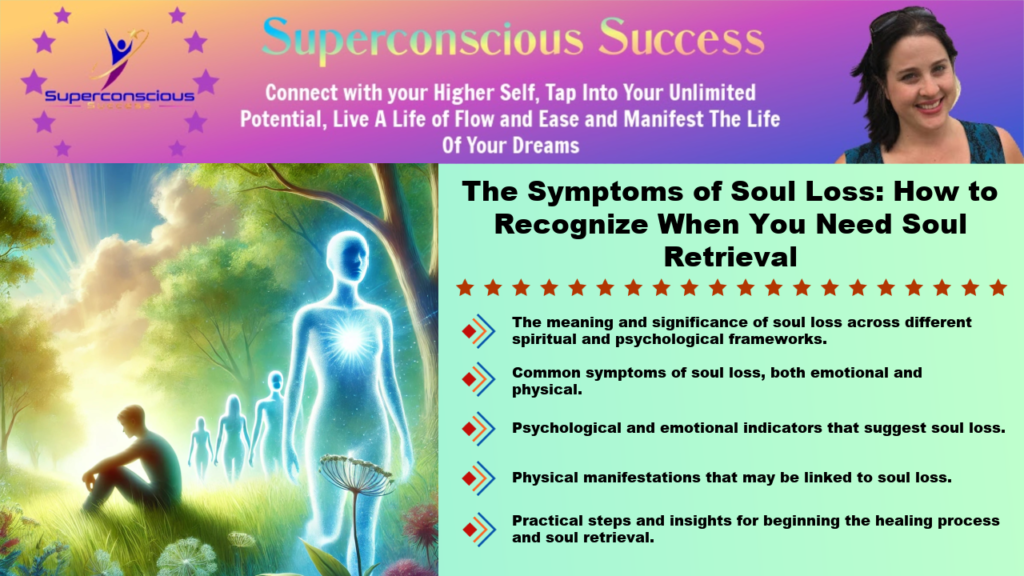
In this blog post, you’ll discover the concept of soul loss, exploring its spiritual, psychological, and physical dimensions. We’ll delve into what soul loss means, its common symptoms, and how it affects your well-being. You’ll learn to recognize the signs of soul loss in yourself and others, understand the underlying causes, and explore the journey towards healing and soul retrieval. By the end, you’ll have a comprehensive understanding of soul loss and practical insights to begin your path toward holistic restoration and balance.
Soul loss can affect your emotional and physical well-being. Some of the symptoms you may experience include:
Pervasive Feeling of Emptiness
The pervasive feeling of emptiness as a symptom of soul loss is a deep, persistent void within, unaffected by external achievements or relationships. This sensation of hollowness often stems from traumatic experiences or significant emotional distress that fragment the soul. Individuals with soul loss may feel disconnected from their emotions and the world, unable to find fulfillment or meaning in life. This emptiness can lead to chronic fatigue and a sense of isolation, making everyday tasks feel overwhelming and relationships difficult to maintain. Addressing this symptom involves holistic healing practices, such as soul retrieval, to restore the lost parts of the soul and achieve a sense of wholeness and balance.
Depression
Depression as a symptom of soul loss is a deep, unshakable sadness and hopelessness that goes beyond typical depressive episodes. It often results from traumatic experiences or prolonged emotional distress that fragment the soul. This form of depression involves a profound disconnection from oneself, making it difficult to find joy or motivation in activities that once brought happiness. Healing this type of depression requires addressing both psychological and spiritual dimensions to reintegrate the lost parts of the soul and restore emotional well-being.
Chronic Fatigue
Chronic fatigue as a symptom of soul loss is a profound and persistent exhaustion that cannot be alleviated by rest or relaxation. This type of fatigue stems from the deep depletion of the soul’s energy due to traumatic experiences or significant emotional distress that cause parts of the soul to fragment. Individuals experiencing this symptom may feel perpetually drained, making even simple daily tasks feel insurmountable. The underlying spiritual disconnection exacerbates physical weariness, emphasizing the need for holistic healing practices like soul retrieval to restore the lost parts of the soul and rejuvenate both the body and spirit.
Sense of Disconnection
A sense of disconnection as a symptom of soul loss is the profound feeling of being detached from oneself and the world around. This detachment often follows traumatic experiences or significant emotional distress that fragment the soul, leading to an inner void. Individuals may feel alienated from their own emotions, going through life’s motions without truly engaging or experiencing it. This disconnection extends to relationships, making it difficult to form meaningful connections with others and often resulting in isolation. Addressing this symptom involves holistic healing practices, such as soul retrieval, to reintegrate the fragmented parts of the soul and restore a sense of wholeness and connectedness.
Lack of Purpose
A lack of purpose as a symptom of soul loss is characterized by a profound sense of aimlessness and meaninglessness in your life. This feeling often arises after traumatic experiences or prolonged emotional distress that cause parts of your soul to fragment. You may struggle to find motivation or direction, questioning the value of your endeavors and feeling adrift without clear goals. This existential void can lead to despair and a pervasive sense of being stuck.
Recognizing these symptoms is the first step toward addressing soul loss. By identifying these signs, you can begin the journey toward healing and reclaiming wholeness and vitality.

















